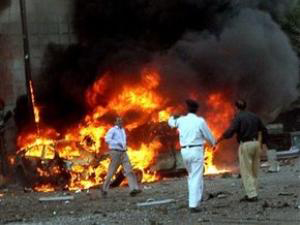Editor's note: Updates with casualties
Back-to-back bombings ripped through a Sufi shrine in Pakistan's southern city of Karachi on Thursday, killing up to eight people and injuring more than 50, a government minister said, dpa reported.
The two blasts took place at the mausoleum of 8th century saint Abdullah Shah Ghazi, where hundreds of people had gathered for traditional Thursday prayers.
Dr Saghir Ahmed, the Health Minister for Sindh province - of which Karachi is the capital - said that eight people had died.
Semi Jamali, the senior medical officer at Jinnah Hospital, said that more than 65 people with injuries had been brought there. Women and children were among the wounded.
Mohammad Asif, an eyewitness, said that the first bomber reached the walkthrough gate and detonated his explosive, clearing the way for the second bomber. The other bomber climbed the stairs that lead to the main compound but exploded before he could reach there.
"Thanks God, he exploded on the stairs. If he had reached the main compound the damage would have been immense since there were hundreds of people gathered," Asif added.
Taliban claimed responsibility for the attack. Ihsanullah Ishan, the deputy spokesman of Tehrik-e-Taliban Pakistan, the umbrella group of more than a dozen militant outfits, said that the people who were gathered were brelvis - followers of Brelvi Islam of which Sufism is a branch.
"They have opposed us and supported the government and that's why we attacked them," Ihsan said.
The attack recalls the bloodshed on July 1, when two suicide bombers detonated explosives as thousands of worshippers were gathered for prayers at the mausoleum of 11th-century saint Abul Hassan Ali Hajvery, commonly known as Data Ganj Baksh.






